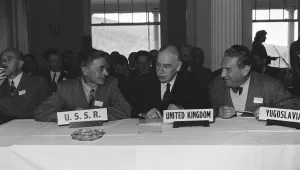International Security is America's leading peer-reviewed journal of security affairs.
This policy brief is based on "China's Century? Why America's Edge Will Endure," which appears in the winter 2011/12 issue of International Security.
Bottom Lines
- China Is Not Catching Up. The United States is now wealthier, more innovative, and more militarily powerful compared to China than it was in 1991.
- Globalization and Hegemony Help Sustain the United States' Lead. Globalization allows U.S. firms to specialize in high-value activities, exploit innovations created in other countries, and attract high-quality human capital. Hegemony not only impedes China's attempts to balance against the United States, but also helps the United States compel other countries to subsidize the U.S. military and economy and contribute to international security and commerce.
- Stay the Course in Asia. The United States should maintain deep economic ties with Asian countries, including China, and a robust diplomatic and military presence in the region.
China Is Not Catching Up
Despite the hype about the rise of China, current power trends favor continued U.S. dominance. National power has three main material components: wealth, innovation, and military power. Over the last twenty years, China has fallen further behind the United States in all of these areas.
Wealth: Today the average Chinese citizen is $17,000 poorer relative to the average American than he was in 1991. Moreover, China's debt-to-GDP ratio is much higher, perhaps twice as high, as the United States'. China narrowed the gap in terms of gross domestic product (GDP) and will likely overtake the United States as the world's largest economy sometime between 2015 and 2040. What matters for national power, however, is not gross wealth, but net wealth—the wealth left over after people are clothed and fed. China's 1.3 billion people produce a large volume of output, but they also consume most of it immediately, leaving little left over for national purposes. For this reason, GDP has never been an accurate measure of national power. In 1870, Britain ruled a quarter of the globe, but its GDP was half the size of China's (in the midst of its "century of humiliation") and dwarfed by India's, a country that Britain colonized. This dominance stemmed not from the absolute size of Britain's economy, but from its superior level of economic development, measured in terms of per capita income, which was the highest in the world and six times higher than China's and India's. Today, U.S. per capita income is six times higher than China's and rising.
Innovation: Since 1991, China has significantly increased its volume of basic scientific research, but it has fallen further behind in innovation. China employs more scientists and engineers than the United States and has increased its share of world scientific articles. The United States, however, doubled its lead in research-and-development spending, quadrupled its lead in value-added in high-technology industries, and increased its lead in international patents by 35 percent. China overtook the United States as the world's leading exporter of high-technology products, but China's high-technology exports are not very Chinese, and not very high-tech—more than 90 percent are produced by foreign firms and consist of imported components that are merely assembled in China. These percentages have increased over time, a trend that suggests Chinese firms are falling further behind foreign competitors.
Military Power: Since 1991, U.S. defense spending has risen by $140 billion relative to China's, even excluding spending in Iraq and Afghanistan. More important, the gap in military spending understates the true military gap because the United States gets more bang for the buck—each dollar it spends produces more force than each dollar China spends. In a separate study, I found that developing countries systematically fail at warfare, regardless of the size of their defense budgets, because they lack the economic capacity to maintain, modernize, and integrate individual technologies into cohesive military systems. Statistical analyses suggest that military effectiveness is determined by a country's level of economic development, as measured by per capita income. As noted above, China's per capita income has declined significantly relative to the United States'. China's defense industry has also fallen further behind: in 2008, the U.S. share of the world conventional arms market surged to 68 percent while China's share dropped below 1.5 percent. If history is any guide, this growing economic gap is also a growing military gap.
Globalization and Hegemony Help Sustain the United States' Lead
Why is the United States rising relative to China? Conventional wisdom assumes that the United States is doomed to decline because of globalization—the integration of national economies and resultant diffusion of technology from developed to developing countries—and the hegemonic burdens the United States bears to sustain globalization. Globalization and hegemony, however, are essential pillars of U.S. power.
Globalization causes wealth and innovation to cluster in areas that are already wealthy and innovative. Compared to a developing country such as China, the United States is primed to exploit globalization because its system of secure property rights, world-class universities, advanced capital markets, flexible labor laws, military superiority, and legions of multinational companies makes it an especially attractive place in which to invest and live. As a result, the dollar is the world's reserve currency, and the United States is the world's largest recipient of foreign direct investment and immigrants. Moreover, the emergence of global production networks allows U.S. firms to reap self-reinforcing competitive advantages, farming out low-value manufacturing to developing countries and investing the savings in technological modernization and rejuvenation.
Likewise, the United State' hegemonic presence abroad is, on balance, profitable. No doubt, the United States bears a significant share of the costs of maintaining international security and commerce, but it also takes a disproportionately large share of the gains. Aspects of U.S. hegemony typically considered liabilities are better characterized as vital assets. Maintaining global military superiority, for example, may cost American taxpayers 4 percent of GDP each year, but it also gives the United States tremendous influence and allows it to run a protection racket, trading security for favors and money from other countries. Similarly, allowing the dollar to function as the world's reserve currency may handicap U.S. exports, but it also comes with perks such as seigniorage and the ability to run perpetual deficits. Historically, hegemony provoked counter-balancing coalitions. Today, however, U.S. hegemony deters balancing: because the margin of superiority between the United States and second-tier states is so large, most weaker states avoid direct confrontation with the United States and either bandwagon with it or, at most, engage in soft balancing—using international institutions and diplomacy to constrain U.S. foreign policy without sparking serious conflict. As a result, the United States faces less opposition than past hegemons and runs less risk of succumbing to imperial overstretch.
Stay the Course In Asia
The widespread belief that the United States is in decline, and that globalization and hegemony are to blame, rallies support for protectionism and retrenchment—the curtailment of economic links between the United States and potential challengers and the pruning of all foreign policy obligations save those linked to vital interests, defined in a narrow and national manner. Yet, the United States' ability to rise relative to China while propping up the world economy and sustaining a robust diplomatic and military presence abroad suggests policymakers that should resist calls for radical policy change.
In Asia, the United States should continue to pursue a three-part strategy: (1) maintain a steadfast commitment to defend allies and secure commerce backed up with a significant forward military presence; (2) expand trade and investment with, and immigration from, Asian countries, including China; and (3) develop and participate in regional institutions. If this sounds like a reassertion of the Barack Obama administration's recent "pivot" toward Asia as well as the Pentagon's 1995 East Asia Strategy Review, that's because it is. U.S. foreign policy in Asia has been, on the whole, extremely successful for the past two decades. The region is generally peaceful and increasingly prosperous, and the power trends favor continued U.S. dominance. "More of the same" may be an underwhelming call to action, but U.S. engagement in Asia is just as necessary and just as vital as it has ever been.
Related Resources
Babones, Salvatore. "The Middling Kingdom: The Hype and Reality of China's Rise," Foreign Affairs 90, no. 5 (September/October 2011): 79–88.
Gilpin, Robert. War and Change in World Politics. Cambridge: Cambridge University Press, 1981.
National Intelligence Council, Global Trends 2025: A Transformed World. Washington, D.C.: National Intelligence Council, 2008.
Subramanian, Arvind. "The Inevitable Superpower: Why China's Rise Is a Sure Thing," Foreign Affairs 90, no. 5 (September/October 2011): 66–78.
Wohlforth, William C. "The Stability of a Unipolar World," International Security, Vol. 24, No. 1 (Summer 1999): 5–41.
Michael Beckley is an International Security Program Research Fellow at Harvard Kennedy School's Belfer Center for Science and International Affairs. In the fall of 2012, he will become Assistant Professor of Political Science at Tufts University.
International Security is America’s leading peer-reviewed journal of security affairs. It provides sophisticated analyses of contemporary, theoretical, and historical security issues.
International Security is edited at Harvard Kennedy School’s Belfer Center for Science and International Affairs and is published by The MIT Press.
For more information about this publication, please contact the International Security publications coordinator at 617-495-1914.
Statements and views expressed in this policy brief are solely those of the authors and do not imply endorsement by Harvard University, the Harvard Kennedy School, or the Belfer Center for Science and International Affairs.
Beckley, Michael C. “To Stay Ahead of China, Stay Engaged in Asia.” January 2012





